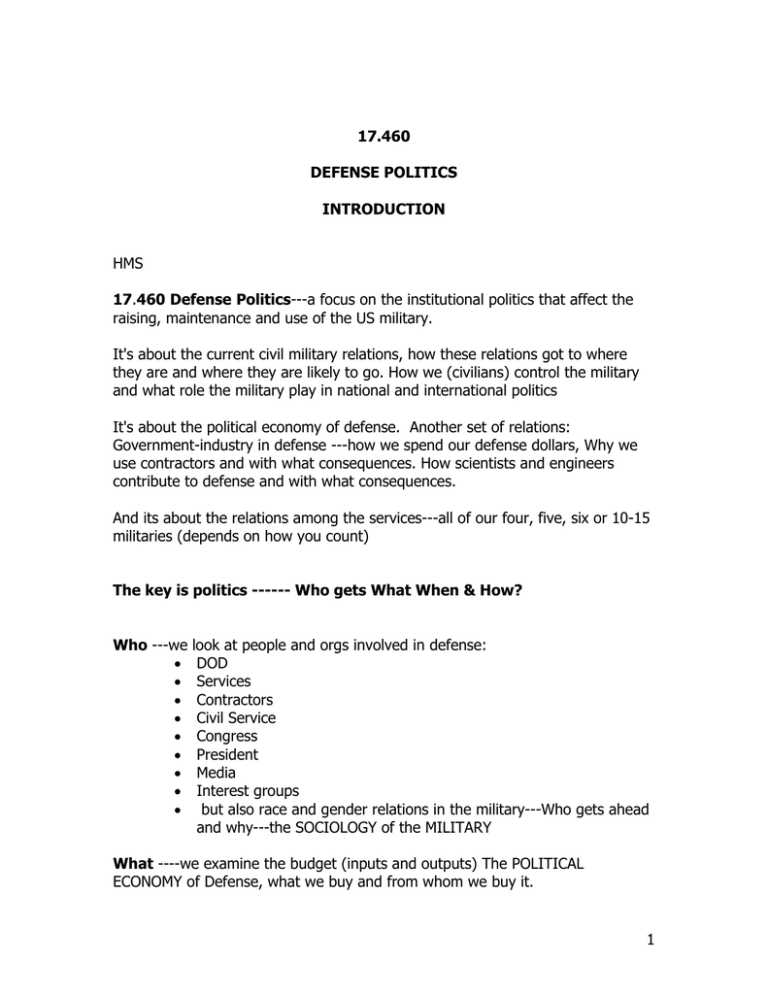HMS raising, maintenance and use of the US military.
advertisement

17.460 DEFENSE POLITICS INTRODUCTION HMS 17.460 Defense Politics---a focus on the institutional politics that affect the raising, maintenance and use of the US military. It's about the current civil military relations, how these relations got to where they are and where they are likely to go. How we (civilians) control the military and what role the military play in national and international politics It's about the political economy of defense. Another set of relations: Government-industry in defense ---how we spend our defense dollars, Why we use contractors and with what consequences. How scientists and engineers contribute to defense and with what consequences. And its about the relations among the services---all of our four, five, six or 10-15 militaries (depends on how you count) The key is politics ------ Who gets What When & How? Who ---we • • • • • • • • • look at people and orgs involved in defense: DOD Services Contractors Civil Service Congress President Media Interest groups but also race and gender relations in the military---Who gets ahead and why---the SOCIOLOGY of the MILITARY What ----we examine the budget (inputs and outputs) The POLITICAL ECONOMY of Defense, what we buy and from whom we buy it. 1 And the When and How---civil-military relations, the POLITICS of DEFENSE What kind of politics is it –corrupt? "Buy because it’s bought in 43 states" >Good time to study • • • • Been mobilized for 65 plus years Only a decade plus ago won Cold War that lasted for 45 years and could have killed us all Instead of demobilizing we had many deployments In a war again, no longer small >Lots of Problems • • • • • • Jointness Empire Budget shortfall Widening gap because few serve Production overhang from Cold War Transformation ---promise of a revolution in way we fight wars >Interesting organizations • Tradition laden organization------Holding Story • Lots of inter-service conflict-----USMC Monument on the Mall • USS Somers Mutiny 1842 / 1843 Explosion of the Peacekeeper • !970 Army surrendered 144 multi-engine aircraft to USAF --------------------------------------------------------------------------------------Let’s Look at Course--> Readings > Books at Coop > Requirement --------PAPER (undergraduates get a Mid-term) Pass around sheet > Office E38-674 2 WHY WORRY ABOUT CIVIL-MILITARY RELATIONS? History ---fear of abuse of State Power (military the instrument of power) US, France, Latin America Recognition that Professional Military is hard foe for even a State to control Power of Profession; Red vs. Expert; SS Special characteristics ---- just the opposite of our civil servants • entry at bottom/no lateral • special schools • ranks – salute rank • move around—general(ists) • top reserved for core professionals –Elite Corps Political bosses have short tenures---temporary vs permanent Historically we relied on Militia ---Kept Professional few in number/ wars fought by Militias and draftees. THE KEY QUESTIONS IN THE STUDY OF PUBLIC POLICY/POLITICS Private vs. Public Planning vs. Market ---not the same as above Decentralized vs. Centralized Why should we want to have four Air Forces, three missile forces, two armies, and one and a half navies? (CG –7th Biggest Navy, 12th biggest AF)? Why do we still have so much waste and duplication? 3 STRUCTURE OF DEFENSE >Before WWII services lead separate lives ---Land/Sea A/N Board JCS set up to deal with British at start of WWII---President and Marshall ran war Unified field commands ---IKE and MacArthur But services largely fought separate wars • Three commands in Pacific • Marines were kept out of Europe by Army • Navy wanted and got on own Pacific first war "Lack of Coordination" charges lead to Unification debate at end of war • waste and duplication • recognition of airpower >National security Act of 1947 (biggest reorg) • Army Plan/ Collins ---classic organizational theory AF wants naval air: Army wants USMC to go away, General Staff • Navy Plan / Eberstadt---decentralized, separate budgets, no SecDef, no one short of President can coordinate • Navy and Congress fears • Compromise with Forrestal ---vague powers to coordinate policy, no general staff, no Chief, no merged services, cabinet >Revolt of Admirals >1949 Amendments • Comptroller • Chair for JCS • Chair for committees • services lose cabinet status >1953 Reform • chair heads staff • more Assistant Secretaries, boards go 4 • beginnings of central staff ---civilian >1958 Amendments Key • Services only separately organized, not administered • true unified commands • SecDef has power to merge • DOD agencies established-----Now eat 15% of budget 14 DARPA, MDA, DCA, CAA, DFA, DINFoSy, DIA, DlegalServicesA, DLA, Dthreat Reduction A, D Sec Coop A, Def Security services, DI&MA, Def Nat Sec Ag. Centralized civilian side of defense---all authority for acquisition and management vested in Secretary----MacNamara used it. >But still doesn't satisfy critics Inefficient and ineffective Lacks resource plan Lacks strategic direction History • • • • • • • of ops failures Vietnam Pueblo/Liberty Son Tay Mayagez Desert One Beirut Granada Blame is SERVICISM ---Parochialism Root of all problems Anti-Navy (Jones/Meyer) Reform---Three Strands 1. Special Ops • new Command • Ass't Secretary • own budget almost a service 5 2. Acquisition • Packard Commission—Administration attempt at reform • New Under Secretary • More assistant secretaries etc • Centralization 3. Goldwater-Nichols Act of 1986 • chair principal advisor • Deputy 4 stars • COMCOMs given control over subordinates • 10-15% reduction in service staffs • joint experience required for flag CENTRALIZED MILITARY/ Religion of JOINTNESS MORE REORGANIZATION PLANNED---BGN/QDR GETTING RID OF SERVICES-- Bilinear Navy (Buyers and Sellers) DISADVANTAGES Limits information on Options Limits incentives for innovation Limits Civil Control --- hinders Responsiveness BUT…….. Jointness the religion • Civilian Officials Don't Want Conflict • Military Loves Planning (socialists) Logroll • Congress had own internal problems---Decentralized after Watergate. Dems then didn't like Weinberger/Lehman/Reagan and Build-Up. Reps recentralize and now don’t want challenge the administration And still no plan, no clear strategic direction, and not efficient 6

